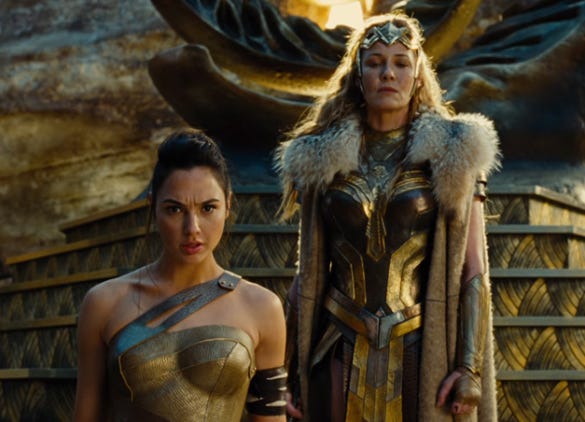Wonder Woman
I think it’s safe to say that I speak for women with mothers born in the 1960s and grandmothers born in the 1930s that “Wonder Woman” is the movie we've been waiting generations for. My grandmother was 3 years old when Sensation Comics #1, Wonder Woman’s first solo comic, was published by DC in 1942. My mother was 12 when “Wonder Woman” starring Lynda Carter first aired on ABC in 1975.
I am 26, the year is 2017, and “Wonder Woman” starring Gal Gadot and directed by Patty Jenkins is the first female-led superhero movie ever that isn’t a joke or an exploitative mess.
I repeat: The year is 2017.
I should love this movie. And perhaps I would have, if DC and Warner Brothers were a more proactive studio, setting the curve instead of following it. If they hadn’t waited so long to take the plunge and give it to us.

“Wonder Woman” is a superhero movie that would have been transcendent 10 years ago before we really knew what modern superhero movies could be. It would have been a great movie even five years ago, when it could have set the tone for the DC Cinematic Universe and given Marvel a run for its money. Instead, “Wonder Woman” is just a good movie, weighted down by the Zack Snyder house style that has never suited its subjects, and never will.
The most disappointing thing about “Wonder Woman” is that it’s so very, very close to perfect. Jenkins shoots Diana of Themyscira with the reverence and awe she deserves, and she never, ever forgets Diana is as joyous as she is strong. Similarly, the first two acts of the movie deftly balance delight with pathos, giving us a more nuanced view of war than we usually get with superhero movies. Plus, the entire cast is noticeably diverse and filled to the brim with talent, so much so that it helps distract from the fact the the story is the most blatant mash-up of "Thor" and "Captain America: The First Avenger" (both 2011) you can possibly imagine.
It definitely helps that Gadot is the best-cast superhero since Robert Downey, Jr. as Tony Stark (and if she’s not, then I’ll eat my cape). I honestly never thought it’d be possible for a human being to encapsulate everything that makes the Wonder Woman I love from the comics Wonder Woman, but Gadot does, and she does it powerfully.
Really, the movie is the most satisfying when Gadot, screenwriter Allan Heinberg and director Jenkins take quiet moments to contemplate who Diana is. Although her island home of the Amazons is nothing short of Paradise, the child Diana wants to learn how to fight not to protect herself, but to defend others, and she defies her mother, Queen Hippolyta (Connie Nielsen), to do so. When she leaves the island and sees Man’s World under a cloud of mustard, Diana still wants to save everyone, and when she realizes she can’t, your heart breaks with hers. After every battle, whether physical or emotional, Diana doesn’t rejoice — she reflects, lifting her face to the sky and taking a deep breath, savoring that moment where something has either ended or just begun. Diana never wavers in her beliefs. And, most importantly, Diana loves.
Those moments and the ones with Steve Trevor (played by the ever charming Chris Pine) make up the wonderful first and second acts of the movie; it’s the third act that truly woofs it. Not surprisingly, this is also the act most bogged down by a fundamental misunderstanding of DC’s main trinity of heroes and a visual style already dated when it became ubiquitous in the early 2000s. To keep things spoiler-free here, I’ll save my rant about the two big reveals in this act for tomorrow’s Movie Jibber Jabber column, but safe to say they’re both obvious from the beginning, and neither those revelations nor the villain who offers them provide any real repercussions. The whole movie falls apart in the third act and forgets to answer two pivotal questions: Why does this matter, and how is it going to change Diana?
Unfortunately, those are two questions they don’t really need to answer, because Diana has already appeared in a movie set 100 years after this one. More than anything, I wish “Wonder Woman” wasn’t tethered to Snyder’s “Justice League” movies. Queen Hippolyta says when Diana leaves Themyscira that Man does not deserve her, and it’s so painfully true. The DC movies try to humanize their heroes by making them dark and dour, but Diana is so much more than human, and so much better than that. Two-thirds of “Wonder Woman” knows this. The other third forgets.
I don’t have daughters yet, and despite my disappointment, I walked out of “Wonder Woman” knowing this is a movie I want them to grow up with, simply because this is the Diana I've wanted to see all my life. I’m glad they’ll get to grow up in a world where a “Wonder Woman” movie has always existed. They’ll never have to know how long their mothers and grandmothers and great-grandmothers had to wait to see their Amazon princess deflect bullets with her bracelets on the big screen. They might even get tired of this movie because I’ll put it on too much and love Diana more and more with every viewing.
But I don’t think they will. I think they’ll love her as much as I do. After all, she is a wonder.


